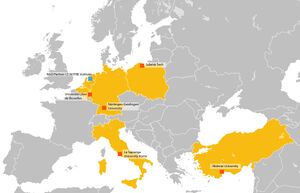Main Page: Difference between revisions
No edit summary |
|||
| Line 4: | Line 4: | ||
'''TELOS''' stands for: '''T'''owards a '''E'''uropean '''L'''andscape Ec'''o'''nomy for a '''S'''ustainable Urban Development | '''TELOS''' stands for: '''T'''owards a '''E'''uropean '''L'''andscape Ec'''o'''nomy for a '''S'''ustainable Urban Development | ||
Project duration: November 2021 - November 2024 | |||
== Why TELOS? == | == Why TELOS? == | ||
Revision as of 07:03, 23 September 2022

TELOS stands for: Towards a European Landscape Economy for a Sustainable Urban Development Project duration: November 2021 - November 2024
Why TELOS?
Our project brings five European metropolitan areas together to address this spatial and educationalchallenge in a new way: we link Rome, Stuttgart, Brussels, Gdansk and Antalya.
TELOS contributes to a large-scale transnational educational transformation and empowers a new generation of visionary professionals, decision-makers and urbanites, to address sustainability challenges through problem-solving approaches that integrate systems thinking, anticipatory strategic competences, real life scenarios and insights, and interpersonal skills.
TELOS aims to build ‘knowledge and action bridges’ between the seemingly competing systems of ecology and economy, as they appear in our everyday urban environment. The target groups of the TELOS project are primarily university staff and students from the following subject domains: urban planning, landscape planning, architecture and landscape architecture, agriculture, regional development, economics, business administration and real estate.
Related stakeholder groups are equitable finance players, real estate developers and related industries, NGOs, municipalities, and the wider public, aiming to break down barriers and foster collaboration while encouraging knowledge exchange at all levels.
TELOS Project Objectives
- To develop the first Landscape Economy curriculum by which learners can deeply immerse in the theories, dialectics and methodologies associated with these emerging concepts
- To build capacity among university teachers, enabling them to successfully implement interdisciplinary and transformative learning settings
- To build up key competences for sustainable urban development
- To create and share knowledge, by documenting TELOS methodology as an open educational resource
- To disseminate the TELOS curriculum and methodology as widely as possible.
Activities
Our project includes the following main activities:
- Development of the TELOS curriculum (design, testing, evaluation,exploitation and dissemination)
- Conceptualisation and implementation of two TELOS staff training events.
- Piloting the TELOS curriculum by means of two blended learning events.
Our blended learning events consist of the following elements:
- the TELOS online course
- the TELOS local labs
- and the TELOS charette.
We will further implement two Multiplier Events during which we involve a wider stakeholder network and diversified audiences into the development and dissemination of the TELOS intellectual outputs.

